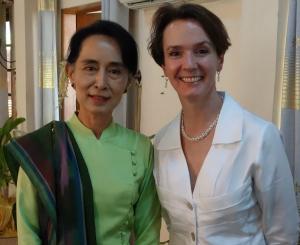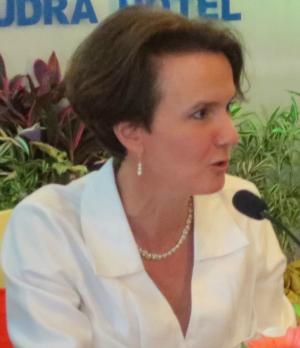Nobel Peace Prize Laureate in Burma Turns to Morningside Heights for Legal Advice
Aung San Suu Kyi Asks Columbia Law School Professor Sarah H. Cleveland to Conduct Seminar in Burma for Members of Parliament
New York, March 11, 2013—When Nobel Peace Prize Laureate and chairwoman of the National League for Democracy Aung San Suu Kyi sought assistance recently on constitutional issues facing the Burmese Parliament, she turned to an international law expert at Columbia Law School.
| Aung San Su Kyi and Professor Sarah Cleveland |
In February, Sarah H. Cleveland, the Louis Henkin Professor in Human and Constitutional Rights, traveled to the Burmese capital, Naypyidaw, at Suu Kyi’s request. She spoke to members of the new Parliament about Burma’s Constitution and ways the legislature can help strengthen democracy and the rule of law in the Southeast Asian country as it embarks on liberalization after decades of repressive military rule.
The military-backed government of President Thein Sein still dominates the Parliament, but there have been strong moves toward democratization in the past few years, many supported by President Sein. In 2008, the country adopted a new constitution, and in 2012, Suu Kyi, after many years of house arrest, was elected to Parliament as a member of the National League for Democracy party.
Back in her office at the Law School, Cleveland explained that Burma’s 2008 constitution embeds the military in the government, giving it 25 percent of the seats in Parliament.
“It was not intended to be a transformative constitution,” she said. “And yet, the constitution created a national parliament, including representation for the first time for ethnic minorities. It articulates individual rights, the principle of an independent judiciary, and establishes a nascent system of federalism. These are building blocks of the basic elements of the rule of law. If protected and allowed to flourish, they could evolve into a true democracy.”
But for many reform-minded members of Parliament, the constitutional and legal issues surrounding their efforts at reform remain uncertain territory. Suu Kyi convened the five-hour seminar led by Cleveland to address some of those concerns. In addition to Suu Kyi, approximately 50 members of Parliament, including members of her Parliamentary Rule of Law Committee, attended.
| Professor Cleveland |
“Some of the members who participated in the seminar had first been elected to the Parliament in 1990, and then were detained for 19 years,” remarked Cleveland. “They were re-elected again and finally seated in 2010. It was very moving.”
Cleveland said the participants were all “very interested, very engaged, and well-informed.”
“We had wide-ranging and animated discussions about many issues, including how the constitution compares to other democratic constitutions and to fundamental human rights. Burma’s constitution ultimately will need reform, but it is one of the hardest in the world to amend. So we also discussed how Parliament can strengthen the rule of law through legislation and interpretation.”
Two days later, Suu Kyi invoked Cleveland’s presentation in a keynote speech at a European Union/Myanmar conference on the rule of law. She emphasized that amending the constitution should be the concern of everyone in the country, so that Burma can meet the standards of a valid democratic society.
Cleveland, who is the faculty co-director of the Human Rights Institute at the Law School, had visited the country once before, in 2000, when she was researching U.S. human rights sanctions against Burma. At that time, she recalled, “no one would speak about the government at all—the contrast with today is quite striking.”
Cleveland’s seminar came about as a result of Suu Kyi’s visit to Columbia University last October, when she spoke at the university’s annual World Leaders Forum. At that time, she called upon U.S. universities to help support her party’s efforts to strengthen human rights and the rule of law in Burma. In response to that request, David L. Philips, head of the Columbia University Institute for the Study of Human Rights’ Program on Peace-building and Human Rights, arranged for faculty across a range of university departments to engage with Burma and Suu Kyi on important issues. Some of the topics include liberalization of the media and training of journalists, peace negotiations with armed ethnic groups in Burma, and improving standards of public health—particularly HIV/AIDS prevention and treatment in conflict areas.
Cleveland also participated in civil society trainings on the rule of law while she was in the country, and she explored how Columbia Law School could contribute to strengthening legal education there. The university’s engagement with the country will be ongoing.
Cleveland recently helped advise members of the National Constituent Assembly of Tunisia on drafting a new constitution for that country, in her capacity as the U.S. observer member on the Venice Commission of the Council of Europe. She served as the counselor on international law to the legal adviser at the U.S. Department of State from 2009 to 2011. In that role, Cleveland supervised work relating to the law of war and counterterrorism, and assisted with international human rights and international justice activities, including efforts relating to Burma. She is a member of the Secretary of State’s Advisory Committee on International Law, and coordinating reporter for the American Law Institute’s forthcoming Restatement (Fourth) of the Foreign Relations Law of the United States.
Will there be further seminars with Suu Kyi and the parliamentarians?
“She only needs to ask,” said Cleveland.

